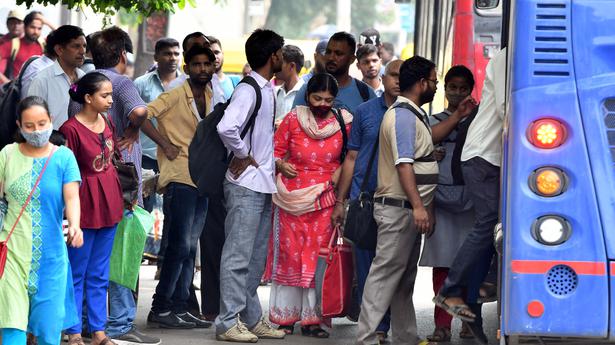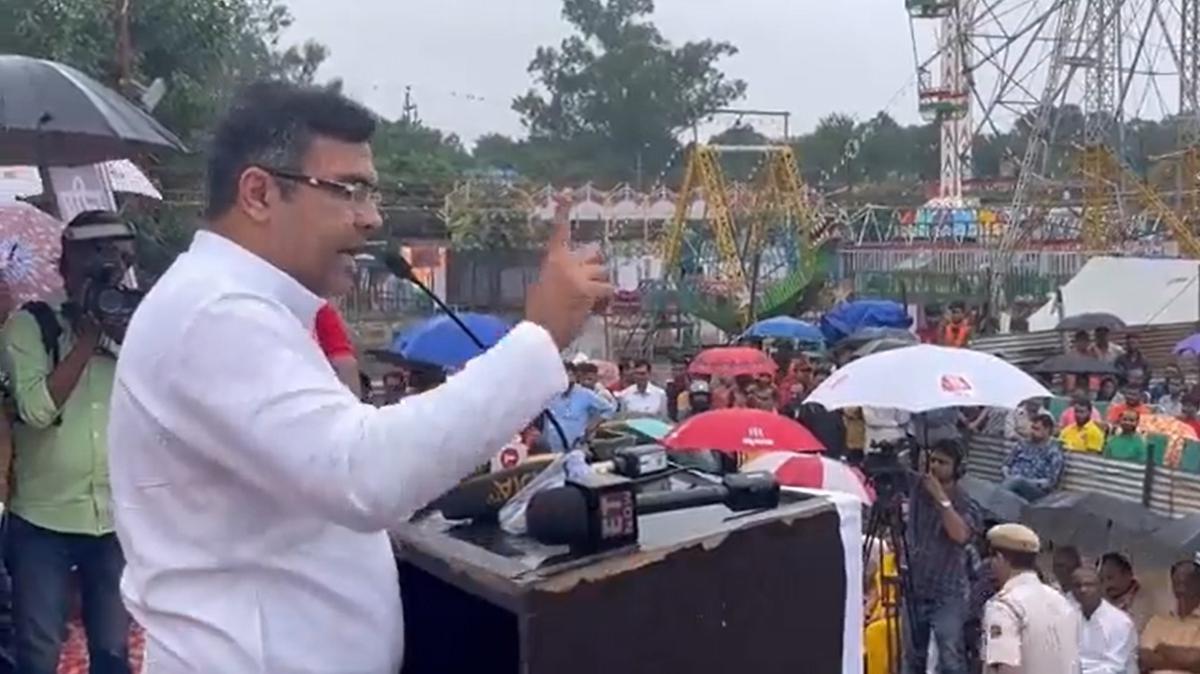Women commuters recount incidents of anxiety; we ensure such complaints are taken up on priority, say police
Women commuters recount incidents of anxiety; we ensure such complaints are taken up on priority, say police
It was only 5.30 p.m. when Arushi Suryavanshi, waiting at a bus stop in Sukhdev Vihar, realised she wasn’t safe. She was being constantly stared at by a man, probably in his 40s. Though the bus stop wasn’t deserted, Ms. Suryavanshi, 24, realised that if she fell prey to the potential molester, she might be left with no help.
When she was about to board the bus to Sarojini Nagar market, the man stealthily touched her thigh and boarded the bus, occupying a seat just behind her. Ms. Suryavanshi understood she was in trouble and got down at the next stop. “Such incidents shouldn’t be normalised but they keep happening to women,” Ms. Suryavanshi said, while waiting for another bus at Defence Colony.
Pink ticket
The Hindu spoke to women across the Capital who commute in buses to understand if the ‘pink ticket’ ensured them safety on buses and bus stands.
The ‘pink ticket’ allows women to travel for free on public buses. The free bus ride scheme for women was launched by the AAP government in the Capital in 2019. However, it comes with a price — the price women have to pay by either ignoring people, staring back at them, filing a complaint, or not taking the same route again.
Police deployment
Deputy Commissioner of Police (Public Relations Office) Suman Nalwa said the police is equipped to deal with any kind of case — harassment, assault, eve-teasing or snatching at bus stops — to make Delhi a safe space for women.
“We understand women find it difficult to navigate through the city, both during the day and night. The Delhi police have deployed over 70,000-80,000 police personnel at different levels in four different shifts to keep a check on crimes against women and maintain the law and order in the city,” Ms. Nalwa said.
Metro is a safer option
Women recount incidents of not just unwanted stares, but also of being approached by potential molesters. Manvi Thakur, 24, who takes a bus daily from Lajpat Nagar to Dwarka around 4 p.m., recalled an incident where she was waiting at the bus stand when a man approached her on the pretext of making a call from her phone. “I refused because I was alone at the bus stop. I could sense that he was trying to initiate a conversation only to get my phone number,” she said.
Out of fear, Ms. Thakur left the bus stop and took a metro instead. “At least there’s a women’s compartment in the metro trains and the platform has CCTV cameras; such persons can be identified,” she said.
At night, Lajpat Nagar becomes difficult to navigate through, Ms. Thakur said. “Vendors in the area shut their shops by 7.30 p.m. There’s a huge crowd at the bus stop at this time. It’s safer to spend a little more and take a different mode of transportation for one’s safety,” she added.
Shopkeepers from the Central Market area in Lajpat Nagar usually board buses around 8 p.m. which makes the area crowded and chaotic at that time. While police personnel take several rounds of the area, a few women waiting at the Lajpat Nagar bus stop do not prefer boarding the bus from there because of unwanted stares.
Ravi Ranjan, 29, who owns a kiosk behind Lajpat Nagar bus stop said, women generally stand away from the stop to avoid harassment incidents. He said the number of women commuters significantly goes down after 8 p.m.
While talking about harassment cases and situations where women feel unsafe near a bus stop, Ms. Nalwa said one must not wait but right away dial 112 — an emergency helpline number — to register a complaint. If a woman travels frequently from a certain area and has witnessed any such incident, she should lodge a complaint at the local police station. She can write to the Station House Officer or the District Commissioner of Police regarding the same.
Focus on zero tolerance
“We ensure that any such complaint will be taken on priority because we’re focusing on zero tolerance. Registering an FIR is becoming mandatory for the local police, however, if one is denied it, she must reach out to us,” the DCP said.
Ms. Nalwa further said, since Delhi has a huge number of women bus commuters, the fairer sex should stay vigilant, “One should have Himmat+ mobile application downloaded on their phones so that they don’t have to worry about their location,” she added.
Ms. Nalwa said PCR vans are deployed around the city. “We’re keeping an eye on local police too, so they can be sensitised regarding such incidents.”
Palak Rajput, 21, an air hostess trainer, recalled an incident that happened a month ago on a bus from South Extension to Dwarka. “I was continuously ignoring a man who had initiated a conversation with me. Thankfully, a person sitting next to me rescued me from the uncomfortable situation,” she said. “Personally, I don’t prefer travelling at night because I know bus stops are unsafe for women as many are secluded at night,” she added.
Dark spots
Explaining how dark areas are under the police radar, the DCP said, “We’re keeping a strict vigil on all districts in the city, while also ensuring that these spots get identified on an everyday basis.” The police is actively identifying dark spots so that women can feel a lot safer while travelling in different modes of transportation.
Explaining, Ms. Nalwa said dark spots are areas that are secluded; these areas do not have proper street lights and have less or no vehicular movement at night. “These areas can be categorised as stretches of road, poor footpaths along the road, little or no transit options and lack of shops,” she added.
The dark spots also have low mobile connectivity, and to tackle such issues, police patrolling has been increased in areas during the dark hour, the DCP said. Dark hours is defined as the period after sunset, Ms. Nalwa said. The police have conveyed the issue to the PWD and telecom companies so that street lights can be installed and efficient signal can be provided.
Slight improvement
Acknowledging that the Delhi police have become efficient now, Shaista Parveen, 23, felt that the situation at bus stops has significantly improved. “If you’re from Delhi, you would know how secluded and isolated bus stops were at night. Now, I can see street lights in some areas,” she said. She boards a bus from various locations in South Delhi like South Extension, Kailash Colony, Moolchand, Lajpat Nagar to AIIMS everyday. “I have seen police personnel on duty at night near bus stops. Since CCTV cameras were installed in buses and marshals were deployed at bus stands, the situation has significantly improved,” she said.
Bad infrastructure
While a few complained about unwanted stares, Ravinder Kaur, 49, a housewife, who boards a bus from Bangla Sahib Gurdwara to Kalkaji every week, complained about infrastructure and functioning.
“The area is really busy in comparison to other areas. Most of the buses cross Patel Chowk. There’s a lot of traffic because of buses queuing up. Most of the buses don’t stop at the designated place rather they stop way ahead of it, leaving us with no option but to run behind the bus, losing out on time and missing out on the seat,” she said.
Ms. Kaur who frequently travels in a bus said this is a pattern that she has noticed. Buses rarely stop at the designated points. “We end up waiting for longer durations only because we keep running from one spot to another looking for a bus,” she added. She further said that the infrastructure is damaged at some bus stops. “Bus stops lack a proper, clean seating arrangement. The area is usually dirty with no dustbins in the vicinity.”




